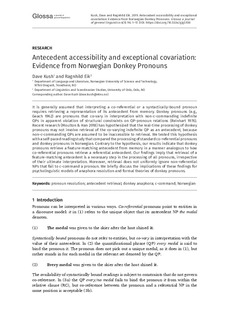| dc.contributor.author | Kush, Dave Whitney | |
| dc.contributor.author | Eik, Ragnhild | |
| dc.date.accessioned | 2019-09-19T08:29:16Z | |
| dc.date.available | 2019-09-19T08:29:16Z | |
| dc.date.created | 2019-08-15T13:11:43Z | |
| dc.date.issued | 2019 | |
| dc.identifier.citation | Glossa: a journal of general linguistics. 2019, 4 (1), 1-17. | nb_NO |
| dc.identifier.issn | 2397-1835 | |
| dc.identifier.uri | http://hdl.handle.net/11250/2617594 | |
| dc.description.abstract | It is generally assumed that interpreting a co-referential or a syntactically-bound pronoun requires retrieving a representation of its antecedent from memory. Donkey pronouns (e.g., Geach 1962) are pronouns that co-vary in interpretation with non-c-commanding indefinite QPs in apparent violation of structural constraints on QP-pronoun relations (Reinhart 1976). Recent research (Moulton & Han 2018) has hypothesized that the real-time processing of donkey pronouns may not involve retrieval of the co-varying indefinite QP as an antecedent, because non-c-commanding QPs are assumed to be inaccessible to retrieval. We tested this hypothesis with a self-paced reading study that compared the processing of standard co-referential pronouns and donkey pronouns in Norwegian. Contrary to the hypothesis, our results indicate that donkey pronouns retrieve a feature-matching antecedent from memory in a manner analogous to how co-referential pronouns retrieve a referential antecedent. Our findings imply that retrieval of a feature-matching antecedent is a necessary step in the processing of all pronouns, irrespective of their ultimate interpretation. Moreover, retrieval does not uniformly ignore non-referential NPs that fail to c-command a pronoun. We briefly discuss the implications of these findings for psycholinguistic models of anaphora resolution and formal theories of donkey pronouns. | nb_NO |
| dc.language.iso | eng | nb_NO |
| dc.publisher | Ubiquity Press | nb_NO |
| dc.relation.uri | https://www.glossa-journal.org/article/10.5334/gjgl.930/ | |
| dc.rights | Navngivelse 4.0 Internasjonal | * |
| dc.rights.uri | http://creativecommons.org/licenses/by/4.0/deed.no | * |
| dc.title | Antecedent accessibility and exceptional covariation: Evidence from Norwegian Donkey Pronouns | nb_NO |
| dc.type | Journal article | nb_NO |
| dc.type | Peer reviewed | nb_NO |
| dc.description.version | publishedVersion | nb_NO |
| dc.source.pagenumber | 1-17 | nb_NO |
| dc.source.volume | 4 | nb_NO |
| dc.source.journal | Glossa: a journal of general linguistics | nb_NO |
| dc.source.issue | 1 | nb_NO |
| dc.identifier.doi | 10.5334/gjgl.930 | |
| dc.identifier.cristin | 1716158 | |
| dc.description.localcode | Copyright The Authors. Open Access CC-BY | nb_NO |
| cristin.unitcode | 194,62,60,0 | |
| cristin.unitname | Institutt for språk og litteratur | |
| cristin.ispublished | true | |
| cristin.fulltext | original | |
| cristin.qualitycode | 1 | |

